Australian Drug Laws: Case Study of Corruption and Legislation
VerifiedAdded on 2022/08/22
|13
|3560
|17
Case Study
AI Summary
This case study examines drug corruption and legislation in Australia, focusing on a scenario involving a dance party and the application of drug laws. The analysis covers various aspects of the law, including the legality of strip searches, the use of sniffer dogs, and the rights of individuals when confronted by police. It delves into Queensland and NSW legislation concerning drug possession, supply, and the defenses available to those accused of drug-related crimes, such as intoxication and doli incapax. The case study also explores the admissibility of evidence, adverse inferences from silence during police interviews, and the implications of international human rights law. The document provides a comprehensive overview of legal principles related to drug offenses, providing insights into real-world applications of law and legal defenses.
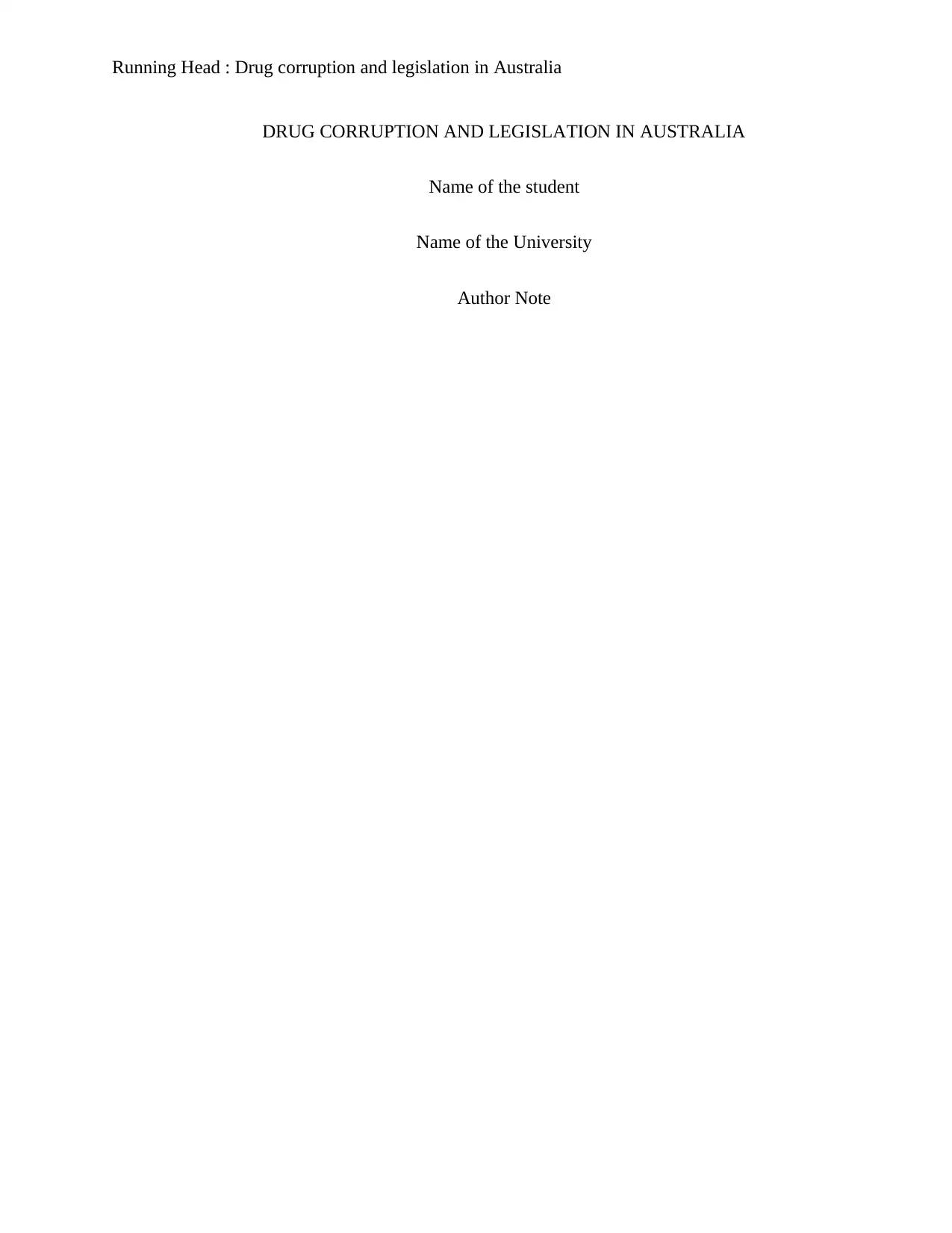
Running Head : Drug corruption and legislation in Australia
DRUG CORRUPTION AND LEGISLATION IN AUSTRALIA
Name of the student
Name of the University
Author Note
DRUG CORRUPTION AND LEGISLATION IN AUSTRALIA
Name of the student
Name of the University
Author Note
Paraphrase This Document
Need a fresh take? Get an instant paraphrase of this document with our AI Paraphraser
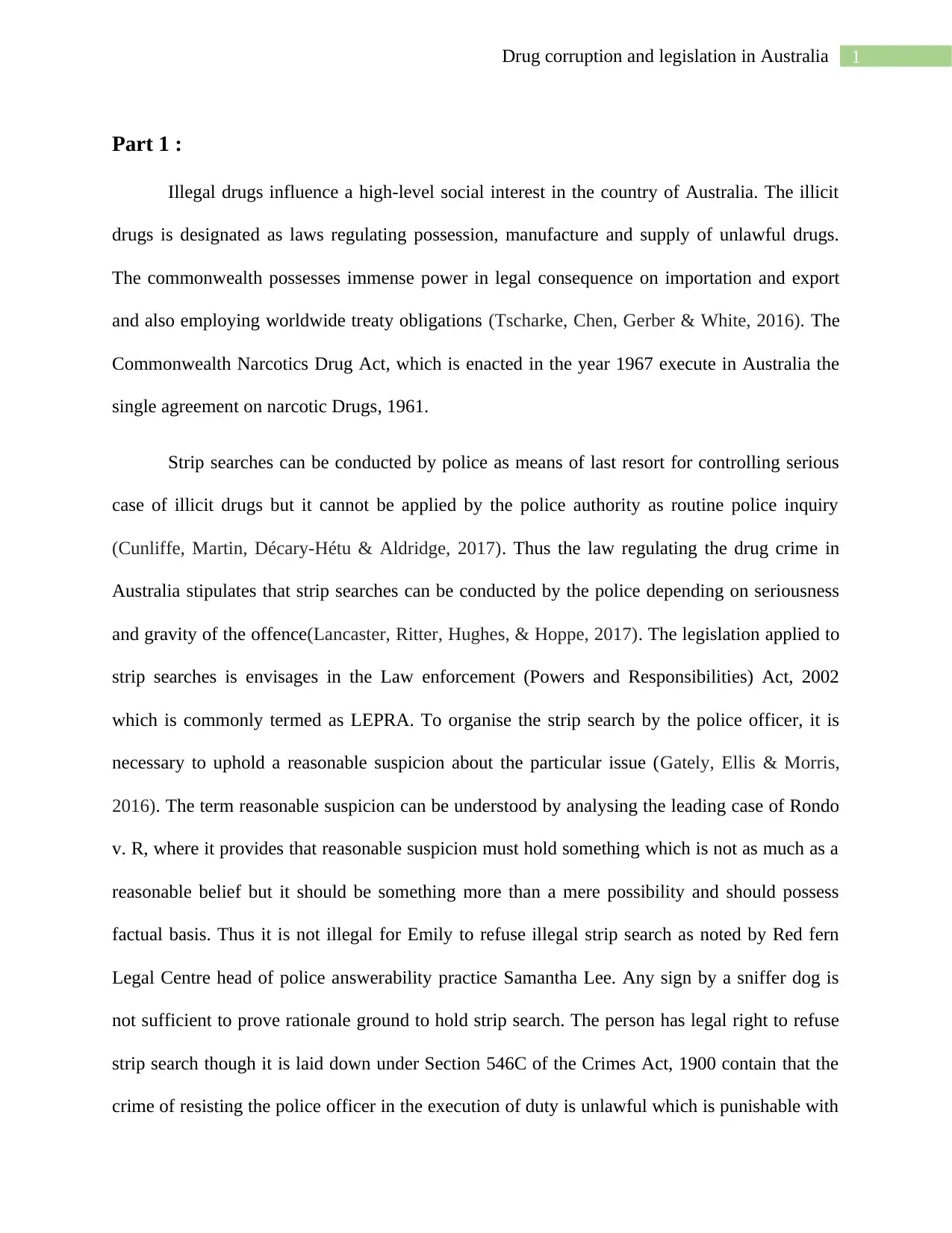
1Drug corruption and legislation in Australia
Part 1 :
Illegal drugs influence a high-level social interest in the country of Australia. The illicit
drugs is designated as laws regulating possession, manufacture and supply of unlawful drugs.
The commonwealth possesses immense power in legal consequence on importation and export
and also employing worldwide treaty obligations (Tscharke, Chen, Gerber & White, 2016). The
Commonwealth Narcotics Drug Act, which is enacted in the year 1967 execute in Australia the
single agreement on narcotic Drugs, 1961.
Strip searches can be conducted by police as means of last resort for controlling serious
case of illicit drugs but it cannot be applied by the police authority as routine police inquiry
(Cunliffe, Martin, Décary-Hétu & Aldridge, 2017). Thus the law regulating the drug crime in
Australia stipulates that strip searches can be conducted by the police depending on seriousness
and gravity of the offence(Lancaster, Ritter, Hughes, & Hoppe, 2017). The legislation applied to
strip searches is envisages in the Law enforcement (Powers and Responsibilities) Act, 2002
which is commonly termed as LEPRA. To organise the strip search by the police officer, it is
necessary to uphold a reasonable suspicion about the particular issue (Gately, Ellis & Morris,
2016). The term reasonable suspicion can be understood by analysing the leading case of Rondo
v. R, where it provides that reasonable suspicion must hold something which is not as much as a
reasonable belief but it should be something more than a mere possibility and should possess
factual basis. Thus it is not illegal for Emily to refuse illegal strip search as noted by Red fern
Legal Centre head of police answerability practice Samantha Lee. Any sign by a sniffer dog is
not sufficient to prove rationale ground to hold strip search. The person has legal right to refuse
strip search though it is laid down under Section 546C of the Crimes Act, 1900 contain that the
crime of resisting the police officer in the execution of duty is unlawful which is punishable with
Part 1 :
Illegal drugs influence a high-level social interest in the country of Australia. The illicit
drugs is designated as laws regulating possession, manufacture and supply of unlawful drugs.
The commonwealth possesses immense power in legal consequence on importation and export
and also employing worldwide treaty obligations (Tscharke, Chen, Gerber & White, 2016). The
Commonwealth Narcotics Drug Act, which is enacted in the year 1967 execute in Australia the
single agreement on narcotic Drugs, 1961.
Strip searches can be conducted by police as means of last resort for controlling serious
case of illicit drugs but it cannot be applied by the police authority as routine police inquiry
(Cunliffe, Martin, Décary-Hétu & Aldridge, 2017). Thus the law regulating the drug crime in
Australia stipulates that strip searches can be conducted by the police depending on seriousness
and gravity of the offence(Lancaster, Ritter, Hughes, & Hoppe, 2017). The legislation applied to
strip searches is envisages in the Law enforcement (Powers and Responsibilities) Act, 2002
which is commonly termed as LEPRA. To organise the strip search by the police officer, it is
necessary to uphold a reasonable suspicion about the particular issue (Gately, Ellis & Morris,
2016). The term reasonable suspicion can be understood by analysing the leading case of Rondo
v. R, where it provides that reasonable suspicion must hold something which is not as much as a
reasonable belief but it should be something more than a mere possibility and should possess
factual basis. Thus it is not illegal for Emily to refuse illegal strip search as noted by Red fern
Legal Centre head of police answerability practice Samantha Lee. Any sign by a sniffer dog is
not sufficient to prove rationale ground to hold strip search. The person has legal right to refuse
strip search though it is laid down under Section 546C of the Crimes Act, 1900 contain that the
crime of resisting the police officer in the execution of duty is unlawful which is punishable with
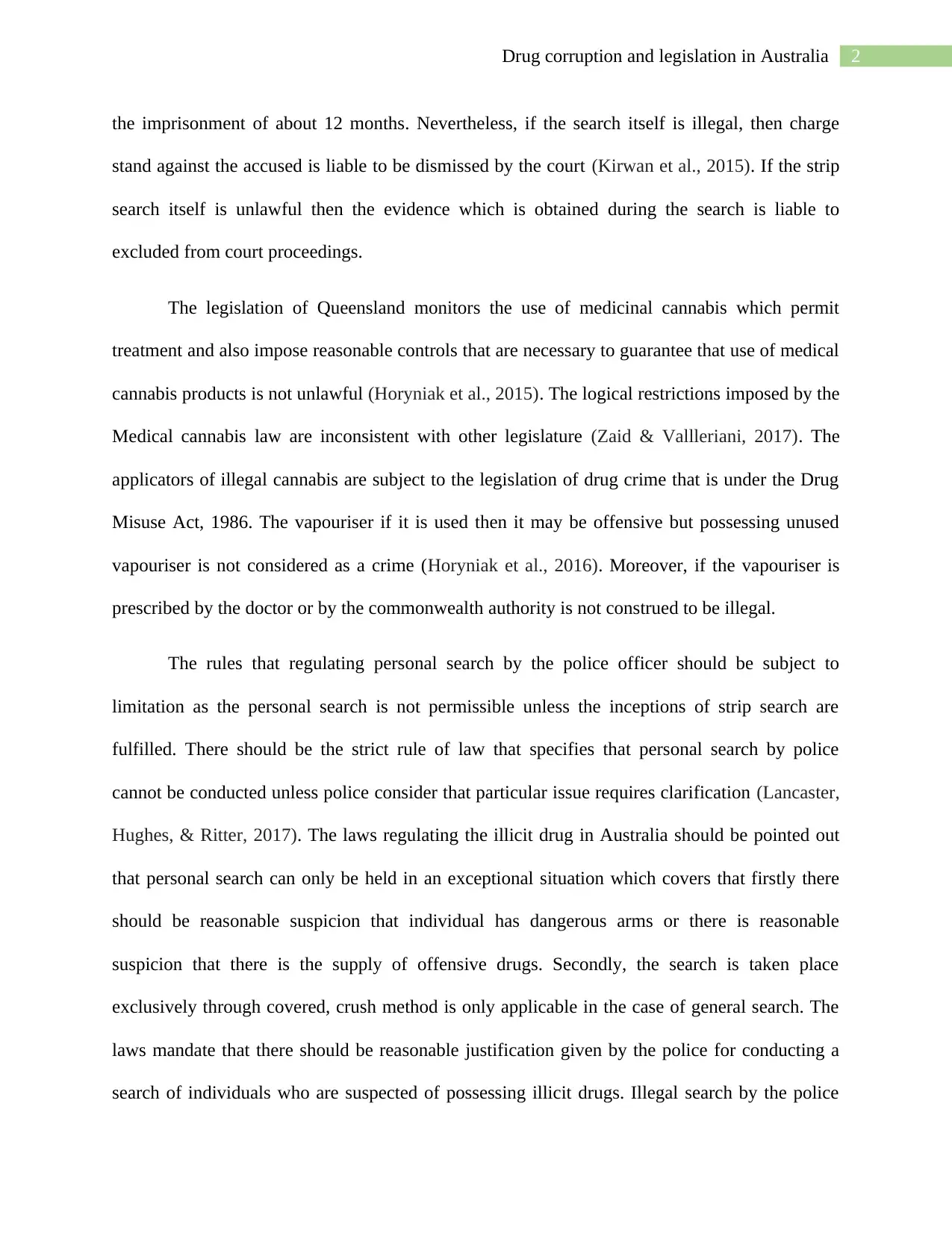
2Drug corruption and legislation in Australia
the imprisonment of about 12 months. Nevertheless, if the search itself is illegal, then charge
stand against the accused is liable to be dismissed by the court (Kirwan et al., 2015). If the strip
search itself is unlawful then the evidence which is obtained during the search is liable to
excluded from court proceedings.
The legislation of Queensland monitors the use of medicinal cannabis which permit
treatment and also impose reasonable controls that are necessary to guarantee that use of medical
cannabis products is not unlawful (Horyniak et al., 2015). The logical restrictions imposed by the
Medical cannabis law are inconsistent with other legislature (Zaid & Vallleriani, 2017). The
applicators of illegal cannabis are subject to the legislation of drug crime that is under the Drug
Misuse Act, 1986. The vapouriser if it is used then it may be offensive but possessing unused
vapouriser is not considered as a crime (Horyniak et al., 2016). Moreover, if the vapouriser is
prescribed by the doctor or by the commonwealth authority is not construed to be illegal.
The rules that regulating personal search by the police officer should be subject to
limitation as the personal search is not permissible unless the inceptions of strip search are
fulfilled. There should be the strict rule of law that specifies that personal search by police
cannot be conducted unless police consider that particular issue requires clarification (Lancaster,
Hughes, & Ritter, 2017). The laws regulating the illicit drug in Australia should be pointed out
that personal search can only be held in an exceptional situation which covers that firstly there
should be reasonable suspicion that individual has dangerous arms or there is reasonable
suspicion that there is the supply of offensive drugs. Secondly, the search is taken place
exclusively through covered, crush method is only applicable in the case of general search. The
laws mandate that there should be reasonable justification given by the police for conducting a
search of individuals who are suspected of possessing illicit drugs. Illegal search by the police
the imprisonment of about 12 months. Nevertheless, if the search itself is illegal, then charge
stand against the accused is liable to be dismissed by the court (Kirwan et al., 2015). If the strip
search itself is unlawful then the evidence which is obtained during the search is liable to
excluded from court proceedings.
The legislation of Queensland monitors the use of medicinal cannabis which permit
treatment and also impose reasonable controls that are necessary to guarantee that use of medical
cannabis products is not unlawful (Horyniak et al., 2015). The logical restrictions imposed by the
Medical cannabis law are inconsistent with other legislature (Zaid & Vallleriani, 2017). The
applicators of illegal cannabis are subject to the legislation of drug crime that is under the Drug
Misuse Act, 1986. The vapouriser if it is used then it may be offensive but possessing unused
vapouriser is not considered as a crime (Horyniak et al., 2016). Moreover, if the vapouriser is
prescribed by the doctor or by the commonwealth authority is not construed to be illegal.
The rules that regulating personal search by the police officer should be subject to
limitation as the personal search is not permissible unless the inceptions of strip search are
fulfilled. There should be the strict rule of law that specifies that personal search by police
cannot be conducted unless police consider that particular issue requires clarification (Lancaster,
Hughes, & Ritter, 2017). The laws regulating the illicit drug in Australia should be pointed out
that personal search can only be held in an exceptional situation which covers that firstly there
should be reasonable suspicion that individual has dangerous arms or there is reasonable
suspicion that there is the supply of offensive drugs. Secondly, the search is taken place
exclusively through covered, crush method is only applicable in the case of general search. The
laws mandate that there should be reasonable justification given by the police for conducting a
search of individuals who are suspected of possessing illicit drugs. Illegal search by the police
⊘ This is a preview!⊘
Do you want full access?
Subscribe today to unlock all pages.

Trusted by 1+ million students worldwide
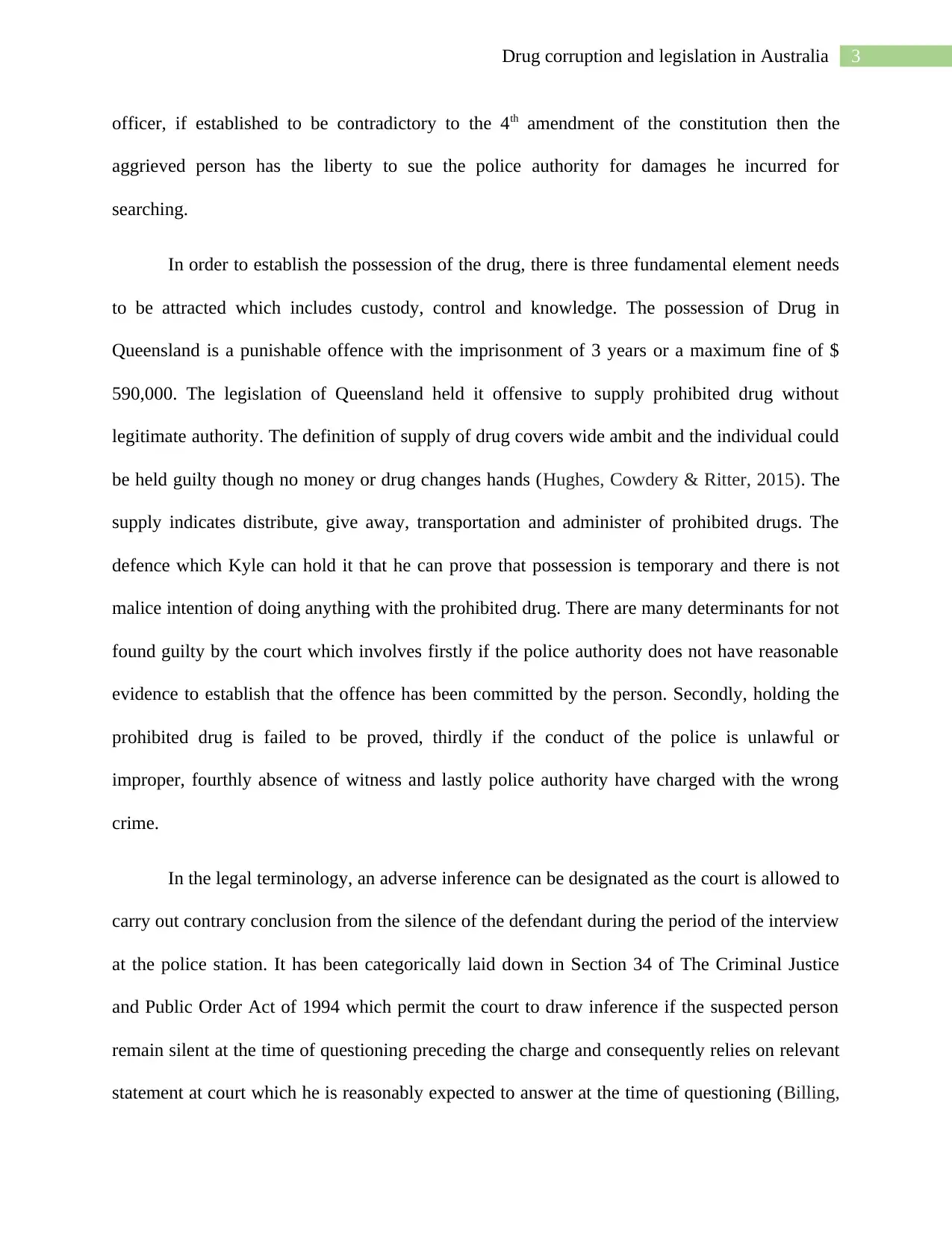
3Drug corruption and legislation in Australia
officer, if established to be contradictory to the 4th amendment of the constitution then the
aggrieved person has the liberty to sue the police authority for damages he incurred for
searching.
In order to establish the possession of the drug, there is three fundamental element needs
to be attracted which includes custody, control and knowledge. The possession of Drug in
Queensland is a punishable offence with the imprisonment of 3 years or a maximum fine of $
590,000. The legislation of Queensland held it offensive to supply prohibited drug without
legitimate authority. The definition of supply of drug covers wide ambit and the individual could
be held guilty though no money or drug changes hands (Hughes, Cowdery & Ritter, 2015). The
supply indicates distribute, give away, transportation and administer of prohibited drugs. The
defence which Kyle can hold it that he can prove that possession is temporary and there is not
malice intention of doing anything with the prohibited drug. There are many determinants for not
found guilty by the court which involves firstly if the police authority does not have reasonable
evidence to establish that the offence has been committed by the person. Secondly, holding the
prohibited drug is failed to be proved, thirdly if the conduct of the police is unlawful or
improper, fourthly absence of witness and lastly police authority have charged with the wrong
crime.
In the legal terminology, an adverse inference can be designated as the court is allowed to
carry out contrary conclusion from the silence of the defendant during the period of the interview
at the police station. It has been categorically laid down in Section 34 of The Criminal Justice
and Public Order Act of 1994 which permit the court to draw inference if the suspected person
remain silent at the time of questioning preceding the charge and consequently relies on relevant
statement at court which he is reasonably expected to answer at the time of questioning (Billing,
officer, if established to be contradictory to the 4th amendment of the constitution then the
aggrieved person has the liberty to sue the police authority for damages he incurred for
searching.
In order to establish the possession of the drug, there is three fundamental element needs
to be attracted which includes custody, control and knowledge. The possession of Drug in
Queensland is a punishable offence with the imprisonment of 3 years or a maximum fine of $
590,000. The legislation of Queensland held it offensive to supply prohibited drug without
legitimate authority. The definition of supply of drug covers wide ambit and the individual could
be held guilty though no money or drug changes hands (Hughes, Cowdery & Ritter, 2015). The
supply indicates distribute, give away, transportation and administer of prohibited drugs. The
defence which Kyle can hold it that he can prove that possession is temporary and there is not
malice intention of doing anything with the prohibited drug. There are many determinants for not
found guilty by the court which involves firstly if the police authority does not have reasonable
evidence to establish that the offence has been committed by the person. Secondly, holding the
prohibited drug is failed to be proved, thirdly if the conduct of the police is unlawful or
improper, fourthly absence of witness and lastly police authority have charged with the wrong
crime.
In the legal terminology, an adverse inference can be designated as the court is allowed to
carry out contrary conclusion from the silence of the defendant during the period of the interview
at the police station. It has been categorically laid down in Section 34 of The Criminal Justice
and Public Order Act of 1994 which permit the court to draw inference if the suspected person
remain silent at the time of questioning preceding the charge and consequently relies on relevant
statement at court which he is reasonably expected to answer at the time of questioning (Billing,
Paraphrase This Document
Need a fresh take? Get an instant paraphrase of this document with our AI Paraphraser
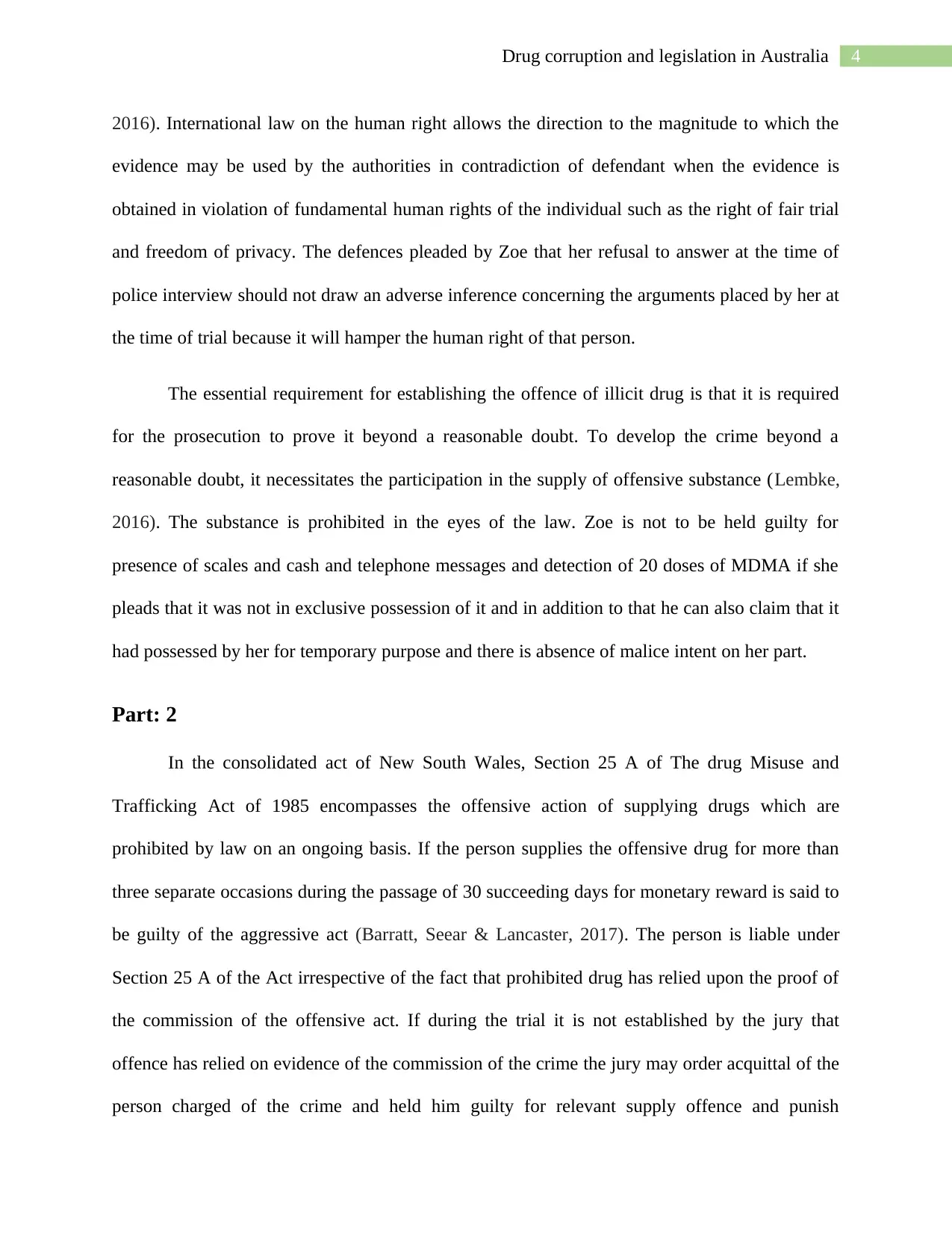
4Drug corruption and legislation in Australia
2016). International law on the human right allows the direction to the magnitude to which the
evidence may be used by the authorities in contradiction of defendant when the evidence is
obtained in violation of fundamental human rights of the individual such as the right of fair trial
and freedom of privacy. The defences pleaded by Zoe that her refusal to answer at the time of
police interview should not draw an adverse inference concerning the arguments placed by her at
the time of trial because it will hamper the human right of that person.
The essential requirement for establishing the offence of illicit drug is that it is required
for the prosecution to prove it beyond a reasonable doubt. To develop the crime beyond a
reasonable doubt, it necessitates the participation in the supply of offensive substance (Lembke,
2016). The substance is prohibited in the eyes of the law. Zoe is not to be held guilty for
presence of scales and cash and telephone messages and detection of 20 doses of MDMA if she
pleads that it was not in exclusive possession of it and in addition to that he can also claim that it
had possessed by her for temporary purpose and there is absence of malice intent on her part.
Part: 2
In the consolidated act of New South Wales, Section 25 A of The drug Misuse and
Trafficking Act of 1985 encompasses the offensive action of supplying drugs which are
prohibited by law on an ongoing basis. If the person supplies the offensive drug for more than
three separate occasions during the passage of 30 succeeding days for monetary reward is said to
be guilty of the aggressive act (Barratt, Seear & Lancaster, 2017). The person is liable under
Section 25 A of the Act irrespective of the fact that prohibited drug has relied upon the proof of
the commission of the offensive act. If during the trial it is not established by the jury that
offence has relied on evidence of the commission of the crime the jury may order acquittal of the
person charged of the crime and held him guilty for relevant supply offence and punish
2016). International law on the human right allows the direction to the magnitude to which the
evidence may be used by the authorities in contradiction of defendant when the evidence is
obtained in violation of fundamental human rights of the individual such as the right of fair trial
and freedom of privacy. The defences pleaded by Zoe that her refusal to answer at the time of
police interview should not draw an adverse inference concerning the arguments placed by her at
the time of trial because it will hamper the human right of that person.
The essential requirement for establishing the offence of illicit drug is that it is required
for the prosecution to prove it beyond a reasonable doubt. To develop the crime beyond a
reasonable doubt, it necessitates the participation in the supply of offensive substance (Lembke,
2016). The substance is prohibited in the eyes of the law. Zoe is not to be held guilty for
presence of scales and cash and telephone messages and detection of 20 doses of MDMA if she
pleads that it was not in exclusive possession of it and in addition to that he can also claim that it
had possessed by her for temporary purpose and there is absence of malice intent on her part.
Part: 2
In the consolidated act of New South Wales, Section 25 A of The drug Misuse and
Trafficking Act of 1985 encompasses the offensive action of supplying drugs which are
prohibited by law on an ongoing basis. If the person supplies the offensive drug for more than
three separate occasions during the passage of 30 succeeding days for monetary reward is said to
be guilty of the aggressive act (Barratt, Seear & Lancaster, 2017). The person is liable under
Section 25 A of the Act irrespective of the fact that prohibited drug has relied upon the proof of
the commission of the offensive act. If during the trial it is not established by the jury that
offence has relied on evidence of the commission of the crime the jury may order acquittal of the
person charged of the crime and held him guilty for relevant supply offence and punish
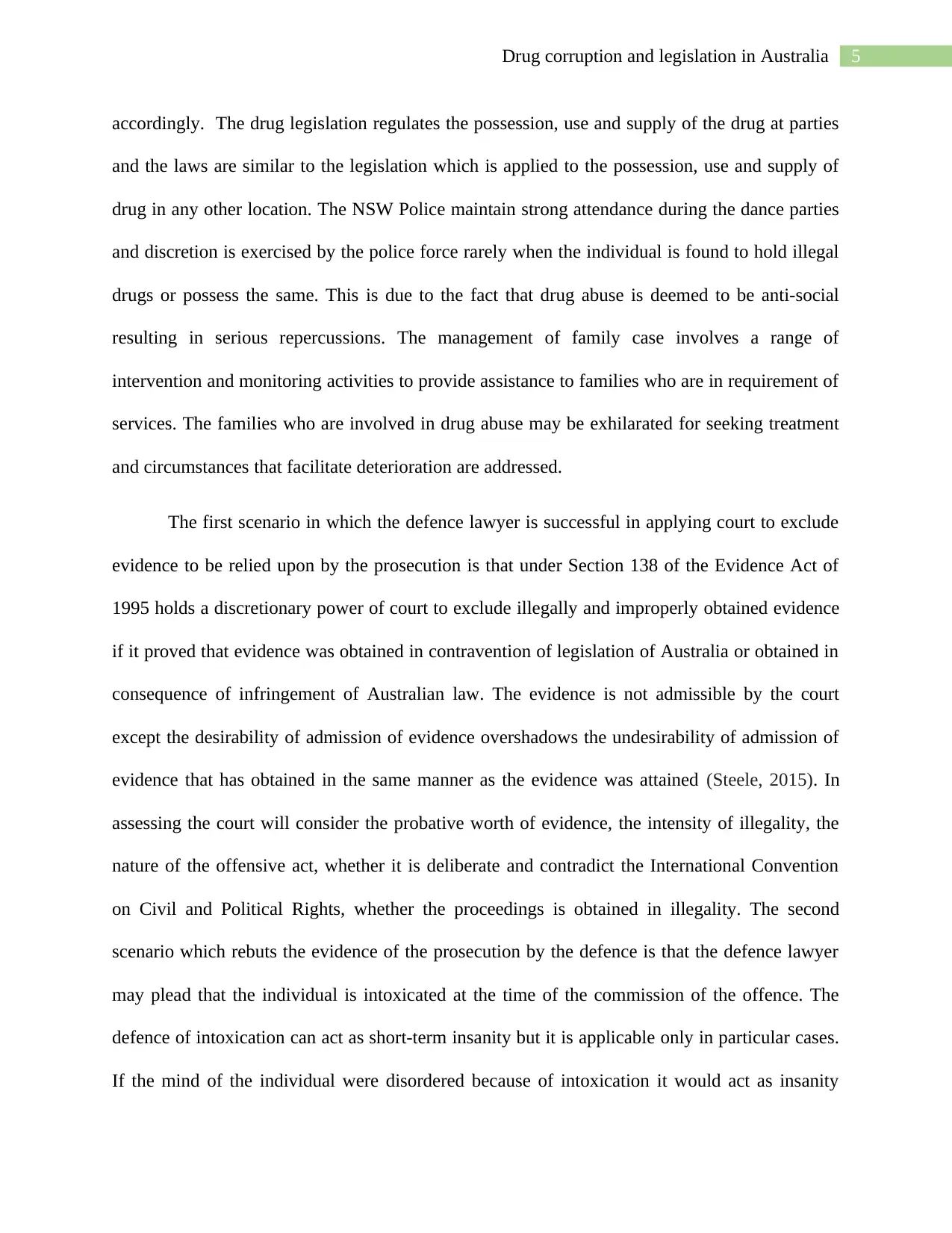
5Drug corruption and legislation in Australia
accordingly. The drug legislation regulates the possession, use and supply of the drug at parties
and the laws are similar to the legislation which is applied to the possession, use and supply of
drug in any other location. The NSW Police maintain strong attendance during the dance parties
and discretion is exercised by the police force rarely when the individual is found to hold illegal
drugs or possess the same. This is due to the fact that drug abuse is deemed to be anti-social
resulting in serious repercussions. The management of family case involves a range of
intervention and monitoring activities to provide assistance to families who are in requirement of
services. The families who are involved in drug abuse may be exhilarated for seeking treatment
and circumstances that facilitate deterioration are addressed.
The first scenario in which the defence lawyer is successful in applying court to exclude
evidence to be relied upon by the prosecution is that under Section 138 of the Evidence Act of
1995 holds a discretionary power of court to exclude illegally and improperly obtained evidence
if it proved that evidence was obtained in contravention of legislation of Australia or obtained in
consequence of infringement of Australian law. The evidence is not admissible by the court
except the desirability of admission of evidence overshadows the undesirability of admission of
evidence that has obtained in the same manner as the evidence was attained (Steele, 2015). In
assessing the court will consider the probative worth of evidence, the intensity of illegality, the
nature of the offensive act, whether it is deliberate and contradict the International Convention
on Civil and Political Rights, whether the proceedings is obtained in illegality. The second
scenario which rebuts the evidence of the prosecution by the defence is that the defence lawyer
may plead that the individual is intoxicated at the time of the commission of the offence. The
defence of intoxication can act as short-term insanity but it is applicable only in particular cases.
If the mind of the individual were disordered because of intoxication it would act as insanity
accordingly. The drug legislation regulates the possession, use and supply of the drug at parties
and the laws are similar to the legislation which is applied to the possession, use and supply of
drug in any other location. The NSW Police maintain strong attendance during the dance parties
and discretion is exercised by the police force rarely when the individual is found to hold illegal
drugs or possess the same. This is due to the fact that drug abuse is deemed to be anti-social
resulting in serious repercussions. The management of family case involves a range of
intervention and monitoring activities to provide assistance to families who are in requirement of
services. The families who are involved in drug abuse may be exhilarated for seeking treatment
and circumstances that facilitate deterioration are addressed.
The first scenario in which the defence lawyer is successful in applying court to exclude
evidence to be relied upon by the prosecution is that under Section 138 of the Evidence Act of
1995 holds a discretionary power of court to exclude illegally and improperly obtained evidence
if it proved that evidence was obtained in contravention of legislation of Australia or obtained in
consequence of infringement of Australian law. The evidence is not admissible by the court
except the desirability of admission of evidence overshadows the undesirability of admission of
evidence that has obtained in the same manner as the evidence was attained (Steele, 2015). In
assessing the court will consider the probative worth of evidence, the intensity of illegality, the
nature of the offensive act, whether it is deliberate and contradict the International Convention
on Civil and Political Rights, whether the proceedings is obtained in illegality. The second
scenario which rebuts the evidence of the prosecution by the defence is that the defence lawyer
may plead that the individual is intoxicated at the time of the commission of the offence. The
defence of intoxication can act as short-term insanity but it is applicable only in particular cases.
If the mind of the individual were disordered because of intoxication it would act as insanity
⊘ This is a preview!⊘
Do you want full access?
Subscribe today to unlock all pages.

Trusted by 1+ million students worldwide
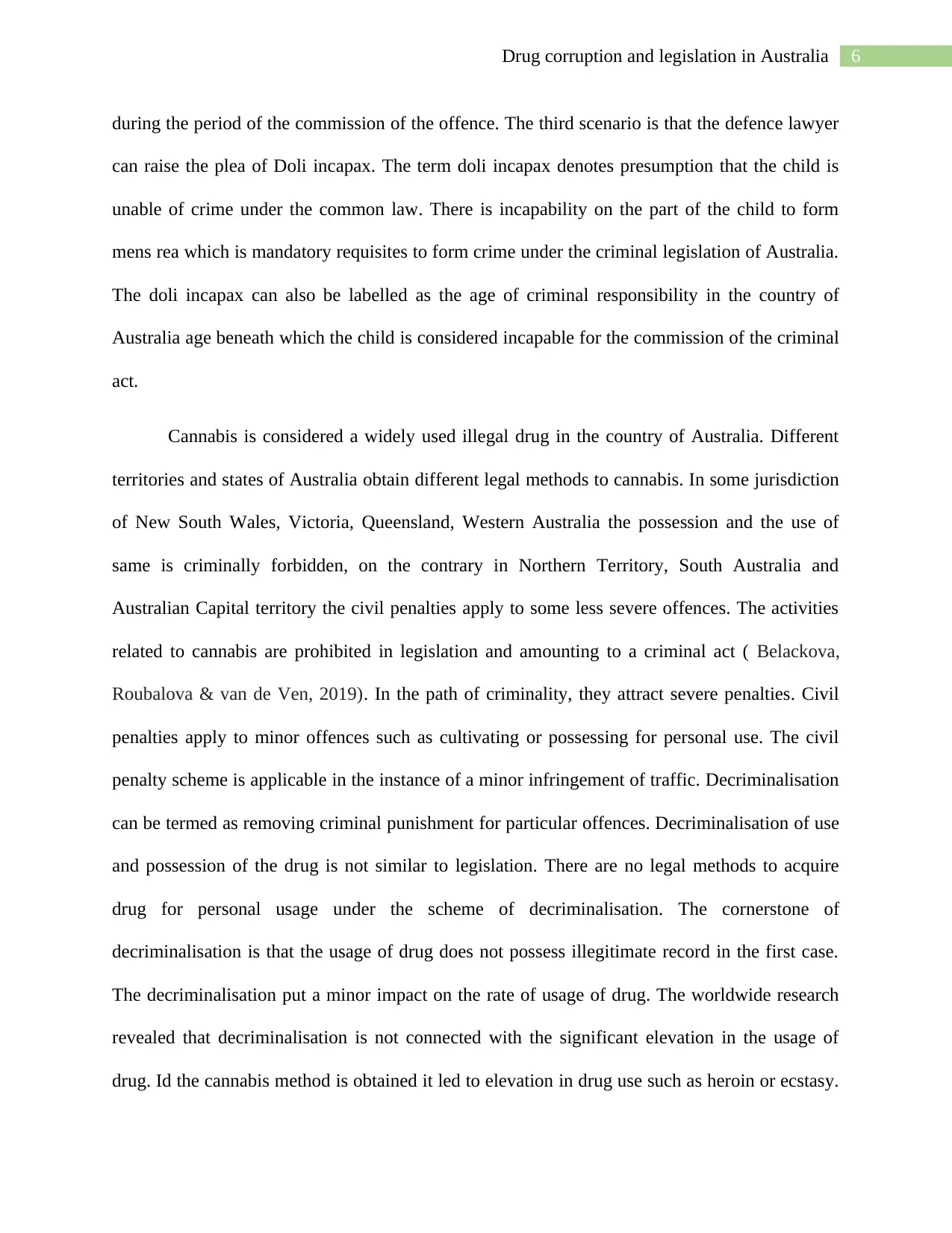
6Drug corruption and legislation in Australia
during the period of the commission of the offence. The third scenario is that the defence lawyer
can raise the plea of Doli incapax. The term doli incapax denotes presumption that the child is
unable of crime under the common law. There is incapability on the part of the child to form
mens rea which is mandatory requisites to form crime under the criminal legislation of Australia.
The doli incapax can also be labelled as the age of criminal responsibility in the country of
Australia age beneath which the child is considered incapable for the commission of the criminal
act.
Cannabis is considered a widely used illegal drug in the country of Australia. Different
territories and states of Australia obtain different legal methods to cannabis. In some jurisdiction
of New South Wales, Victoria, Queensland, Western Australia the possession and the use of
same is criminally forbidden, on the contrary in Northern Territory, South Australia and
Australian Capital territory the civil penalties apply to some less severe offences. The activities
related to cannabis are prohibited in legislation and amounting to a criminal act ( Belackova,
Roubalova & van de Ven, 2019). In the path of criminality, they attract severe penalties. Civil
penalties apply to minor offences such as cultivating or possessing for personal use. The civil
penalty scheme is applicable in the instance of a minor infringement of traffic. Decriminalisation
can be termed as removing criminal punishment for particular offences. Decriminalisation of use
and possession of the drug is not similar to legislation. There are no legal methods to acquire
drug for personal usage under the scheme of decriminalisation. The cornerstone of
decriminalisation is that the usage of drug does not possess illegitimate record in the first case.
The decriminalisation put a minor impact on the rate of usage of drug. The worldwide research
revealed that decriminalisation is not connected with the significant elevation in the usage of
drug. Id the cannabis method is obtained it led to elevation in drug use such as heroin or ecstasy.
during the period of the commission of the offence. The third scenario is that the defence lawyer
can raise the plea of Doli incapax. The term doli incapax denotes presumption that the child is
unable of crime under the common law. There is incapability on the part of the child to form
mens rea which is mandatory requisites to form crime under the criminal legislation of Australia.
The doli incapax can also be labelled as the age of criminal responsibility in the country of
Australia age beneath which the child is considered incapable for the commission of the criminal
act.
Cannabis is considered a widely used illegal drug in the country of Australia. Different
territories and states of Australia obtain different legal methods to cannabis. In some jurisdiction
of New South Wales, Victoria, Queensland, Western Australia the possession and the use of
same is criminally forbidden, on the contrary in Northern Territory, South Australia and
Australian Capital territory the civil penalties apply to some less severe offences. The activities
related to cannabis are prohibited in legislation and amounting to a criminal act ( Belackova,
Roubalova & van de Ven, 2019). In the path of criminality, they attract severe penalties. Civil
penalties apply to minor offences such as cultivating or possessing for personal use. The civil
penalty scheme is applicable in the instance of a minor infringement of traffic. Decriminalisation
can be termed as removing criminal punishment for particular offences. Decriminalisation of use
and possession of the drug is not similar to legislation. There are no legal methods to acquire
drug for personal usage under the scheme of decriminalisation. The cornerstone of
decriminalisation is that the usage of drug does not possess illegitimate record in the first case.
The decriminalisation put a minor impact on the rate of usage of drug. The worldwide research
revealed that decriminalisation is not connected with the significant elevation in the usage of
drug. Id the cannabis method is obtained it led to elevation in drug use such as heroin or ecstasy.
Paraphrase This Document
Need a fresh take? Get an instant paraphrase of this document with our AI Paraphraser
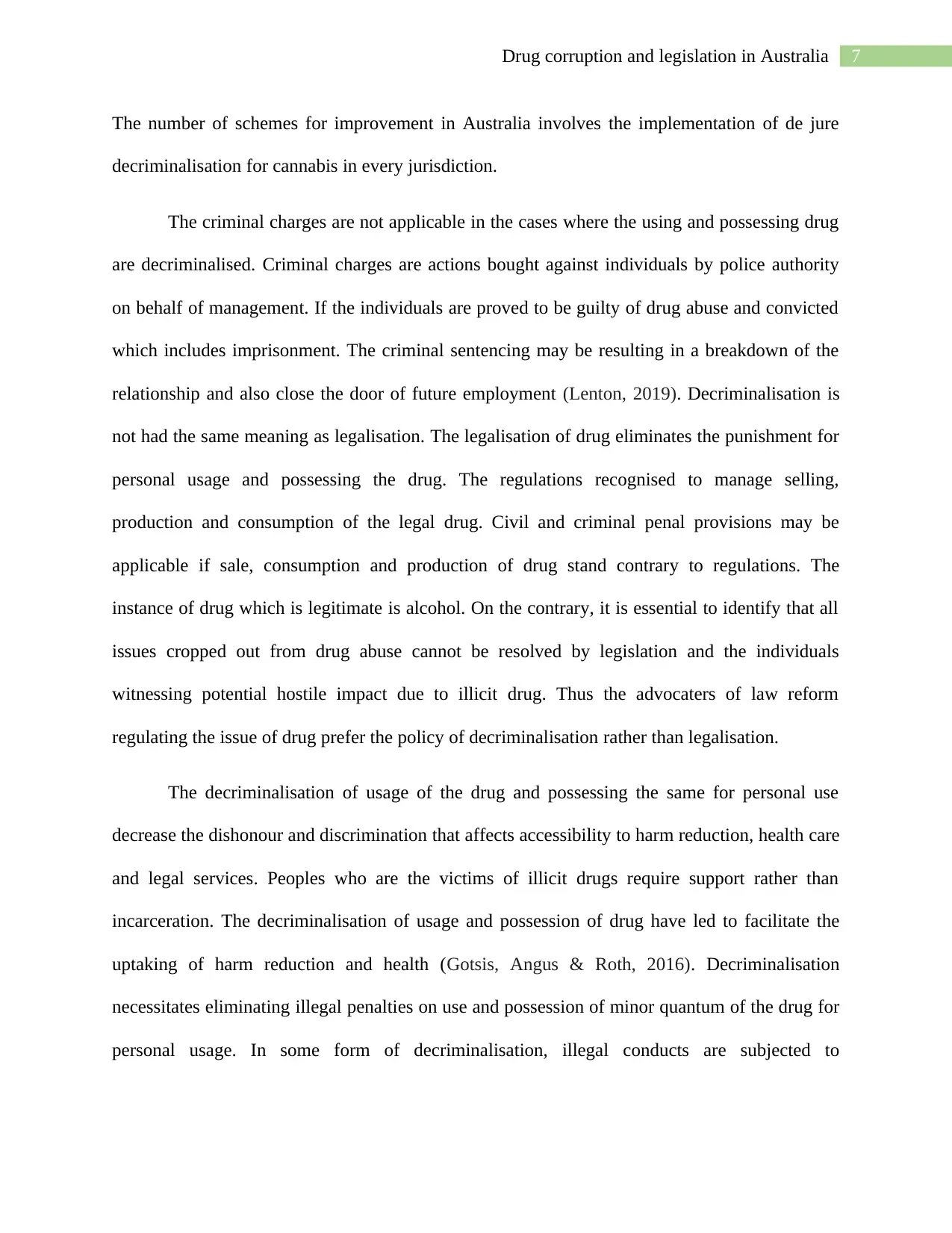
7Drug corruption and legislation in Australia
The number of schemes for improvement in Australia involves the implementation of de jure
decriminalisation for cannabis in every jurisdiction.
The criminal charges are not applicable in the cases where the using and possessing drug
are decriminalised. Criminal charges are actions bought against individuals by police authority
on behalf of management. If the individuals are proved to be guilty of drug abuse and convicted
which includes imprisonment. The criminal sentencing may be resulting in a breakdown of the
relationship and also close the door of future employment (Lenton, 2019). Decriminalisation is
not had the same meaning as legalisation. The legalisation of drug eliminates the punishment for
personal usage and possessing the drug. The regulations recognised to manage selling,
production and consumption of the legal drug. Civil and criminal penal provisions may be
applicable if sale, consumption and production of drug stand contrary to regulations. The
instance of drug which is legitimate is alcohol. On the contrary, it is essential to identify that all
issues cropped out from drug abuse cannot be resolved by legislation and the individuals
witnessing potential hostile impact due to illicit drug. Thus the advocaters of law reform
regulating the issue of drug prefer the policy of decriminalisation rather than legalisation.
The decriminalisation of usage of the drug and possessing the same for personal use
decrease the dishonour and discrimination that affects accessibility to harm reduction, health care
and legal services. Peoples who are the victims of illicit drugs require support rather than
incarceration. The decriminalisation of usage and possession of drug have led to facilitate the
uptaking of harm reduction and health (Gotsis, Angus & Roth, 2016). Decriminalisation
necessitates eliminating illegal penalties on use and possession of minor quantum of the drug for
personal usage. In some form of decriminalisation, illegal conducts are subjected to
The number of schemes for improvement in Australia involves the implementation of de jure
decriminalisation for cannabis in every jurisdiction.
The criminal charges are not applicable in the cases where the using and possessing drug
are decriminalised. Criminal charges are actions bought against individuals by police authority
on behalf of management. If the individuals are proved to be guilty of drug abuse and convicted
which includes imprisonment. The criminal sentencing may be resulting in a breakdown of the
relationship and also close the door of future employment (Lenton, 2019). Decriminalisation is
not had the same meaning as legalisation. The legalisation of drug eliminates the punishment for
personal usage and possessing the drug. The regulations recognised to manage selling,
production and consumption of the legal drug. Civil and criminal penal provisions may be
applicable if sale, consumption and production of drug stand contrary to regulations. The
instance of drug which is legitimate is alcohol. On the contrary, it is essential to identify that all
issues cropped out from drug abuse cannot be resolved by legislation and the individuals
witnessing potential hostile impact due to illicit drug. Thus the advocaters of law reform
regulating the issue of drug prefer the policy of decriminalisation rather than legalisation.
The decriminalisation of usage of the drug and possessing the same for personal use
decrease the dishonour and discrimination that affects accessibility to harm reduction, health care
and legal services. Peoples who are the victims of illicit drugs require support rather than
incarceration. The decriminalisation of usage and possession of drug have led to facilitate the
uptaking of harm reduction and health (Gotsis, Angus & Roth, 2016). Decriminalisation
necessitates eliminating illegal penalties on use and possession of minor quantum of the drug for
personal usage. In some form of decriminalisation, illegal conducts are subjected to
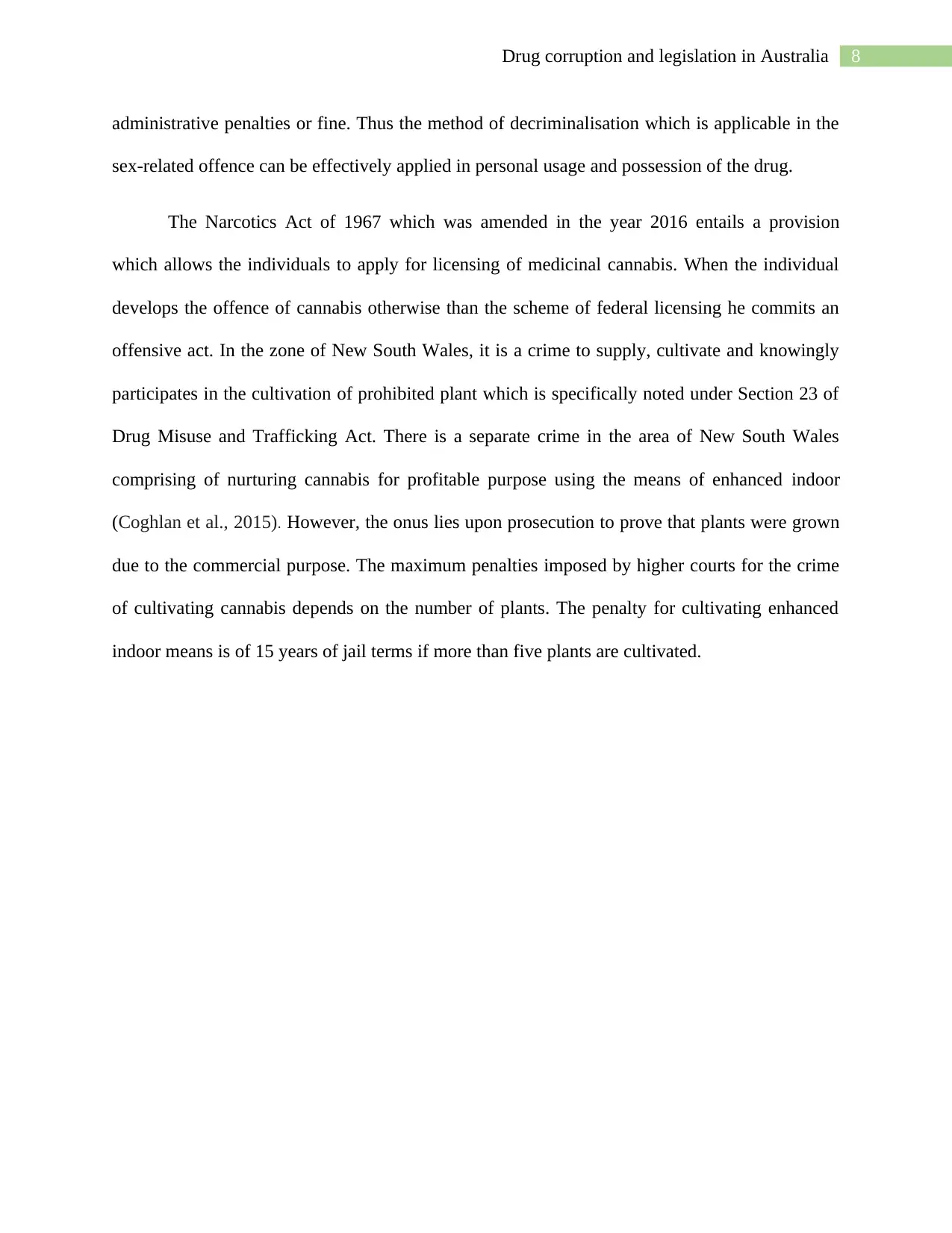
8Drug corruption and legislation in Australia
administrative penalties or fine. Thus the method of decriminalisation which is applicable in the
sex-related offence can be effectively applied in personal usage and possession of the drug.
The Narcotics Act of 1967 which was amended in the year 2016 entails a provision
which allows the individuals to apply for licensing of medicinal cannabis. When the individual
develops the offence of cannabis otherwise than the scheme of federal licensing he commits an
offensive act. In the zone of New South Wales, it is a crime to supply, cultivate and knowingly
participates in the cultivation of prohibited plant which is specifically noted under Section 23 of
Drug Misuse and Trafficking Act. There is a separate crime in the area of New South Wales
comprising of nurturing cannabis for profitable purpose using the means of enhanced indoor
(Coghlan et al., 2015). However, the onus lies upon prosecution to prove that plants were grown
due to the commercial purpose. The maximum penalties imposed by higher courts for the crime
of cultivating cannabis depends on the number of plants. The penalty for cultivating enhanced
indoor means is of 15 years of jail terms if more than five plants are cultivated.
administrative penalties or fine. Thus the method of decriminalisation which is applicable in the
sex-related offence can be effectively applied in personal usage and possession of the drug.
The Narcotics Act of 1967 which was amended in the year 2016 entails a provision
which allows the individuals to apply for licensing of medicinal cannabis. When the individual
develops the offence of cannabis otherwise than the scheme of federal licensing he commits an
offensive act. In the zone of New South Wales, it is a crime to supply, cultivate and knowingly
participates in the cultivation of prohibited plant which is specifically noted under Section 23 of
Drug Misuse and Trafficking Act. There is a separate crime in the area of New South Wales
comprising of nurturing cannabis for profitable purpose using the means of enhanced indoor
(Coghlan et al., 2015). However, the onus lies upon prosecution to prove that plants were grown
due to the commercial purpose. The maximum penalties imposed by higher courts for the crime
of cultivating cannabis depends on the number of plants. The penalty for cultivating enhanced
indoor means is of 15 years of jail terms if more than five plants are cultivated.
⊘ This is a preview!⊘
Do you want full access?
Subscribe today to unlock all pages.

Trusted by 1+ million students worldwide
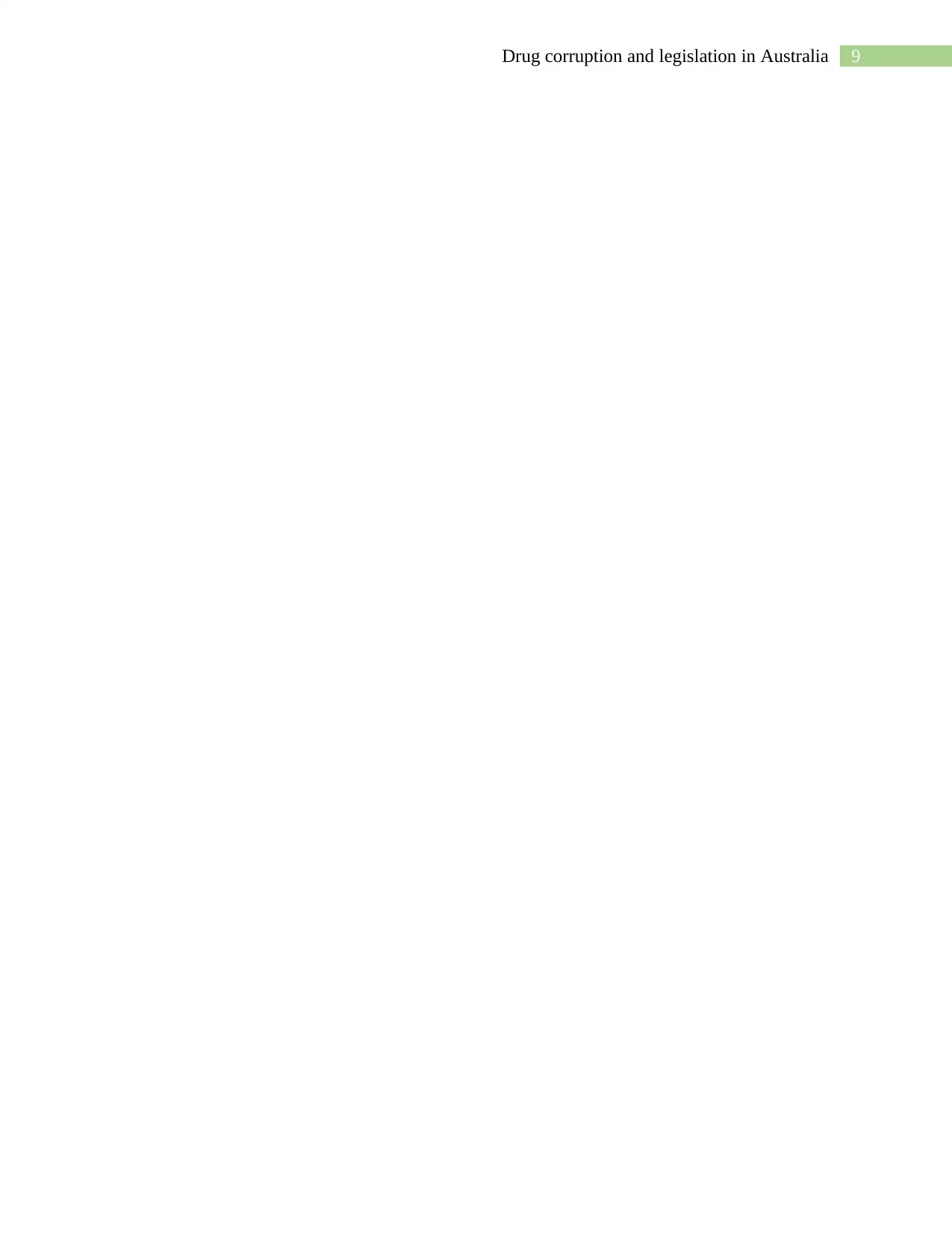
9Drug corruption and legislation in Australia
Paraphrase This Document
Need a fresh take? Get an instant paraphrase of this document with our AI Paraphraser
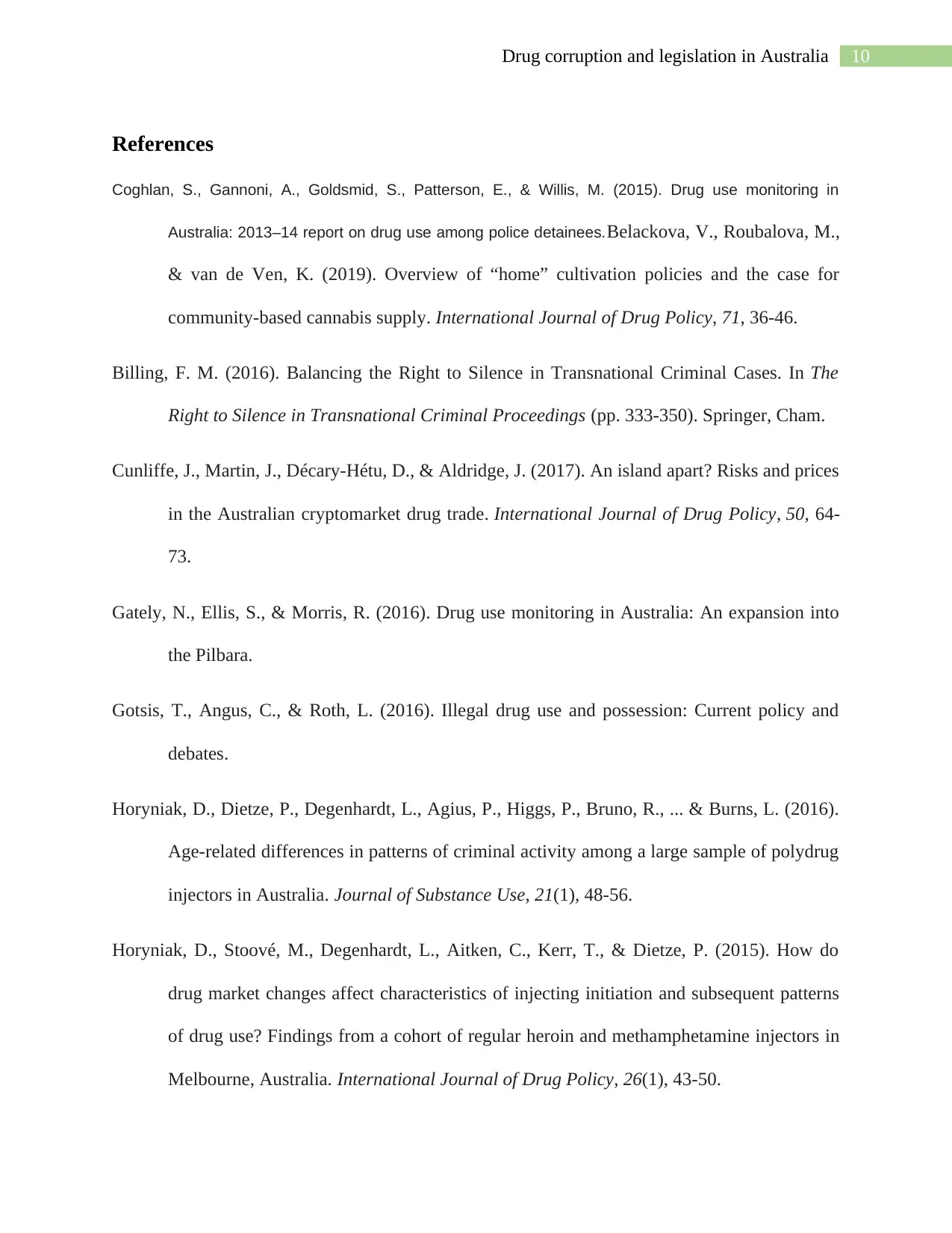
10Drug corruption and legislation in Australia
References
Coghlan, S., Gannoni, A., Goldsmid, S., Patterson, E., & Willis, M. (2015). Drug use monitoring in
Australia: 2013–14 report on drug use among police detainees.Belackova, V., Roubalova, M.,
& van de Ven, K. (2019). Overview of “home” cultivation policies and the case for
community-based cannabis supply. International Journal of Drug Policy, 71, 36-46.
Billing, F. M. (2016). Balancing the Right to Silence in Transnational Criminal Cases. In The
Right to Silence in Transnational Criminal Proceedings (pp. 333-350). Springer, Cham.
Cunliffe, J., Martin, J., Décary-Hétu, D., & Aldridge, J. (2017). An island apart? Risks and prices
in the Australian cryptomarket drug trade. International Journal of Drug Policy, 50, 64-
73.
Gately, N., Ellis, S., & Morris, R. (2016). Drug use monitoring in Australia: An expansion into
the Pilbara.
Gotsis, T., Angus, C., & Roth, L. (2016). Illegal drug use and possession: Current policy and
debates.
Horyniak, D., Dietze, P., Degenhardt, L., Agius, P., Higgs, P., Bruno, R., ... & Burns, L. (2016).
Age-related differences in patterns of criminal activity among a large sample of polydrug
injectors in Australia. Journal of Substance Use, 21(1), 48-56.
Horyniak, D., Stoové, M., Degenhardt, L., Aitken, C., Kerr, T., & Dietze, P. (2015). How do
drug market changes affect characteristics of injecting initiation and subsequent patterns
of drug use? Findings from a cohort of regular heroin and methamphetamine injectors in
Melbourne, Australia. International Journal of Drug Policy, 26(1), 43-50.
References
Coghlan, S., Gannoni, A., Goldsmid, S., Patterson, E., & Willis, M. (2015). Drug use monitoring in
Australia: 2013–14 report on drug use among police detainees.Belackova, V., Roubalova, M.,
& van de Ven, K. (2019). Overview of “home” cultivation policies and the case for
community-based cannabis supply. International Journal of Drug Policy, 71, 36-46.
Billing, F. M. (2016). Balancing the Right to Silence in Transnational Criminal Cases. In The
Right to Silence in Transnational Criminal Proceedings (pp. 333-350). Springer, Cham.
Cunliffe, J., Martin, J., Décary-Hétu, D., & Aldridge, J. (2017). An island apart? Risks and prices
in the Australian cryptomarket drug trade. International Journal of Drug Policy, 50, 64-
73.
Gately, N., Ellis, S., & Morris, R. (2016). Drug use monitoring in Australia: An expansion into
the Pilbara.
Gotsis, T., Angus, C., & Roth, L. (2016). Illegal drug use and possession: Current policy and
debates.
Horyniak, D., Dietze, P., Degenhardt, L., Agius, P., Higgs, P., Bruno, R., ... & Burns, L. (2016).
Age-related differences in patterns of criminal activity among a large sample of polydrug
injectors in Australia. Journal of Substance Use, 21(1), 48-56.
Horyniak, D., Stoové, M., Degenhardt, L., Aitken, C., Kerr, T., & Dietze, P. (2015). How do
drug market changes affect characteristics of injecting initiation and subsequent patterns
of drug use? Findings from a cohort of regular heroin and methamphetamine injectors in
Melbourne, Australia. International Journal of Drug Policy, 26(1), 43-50.
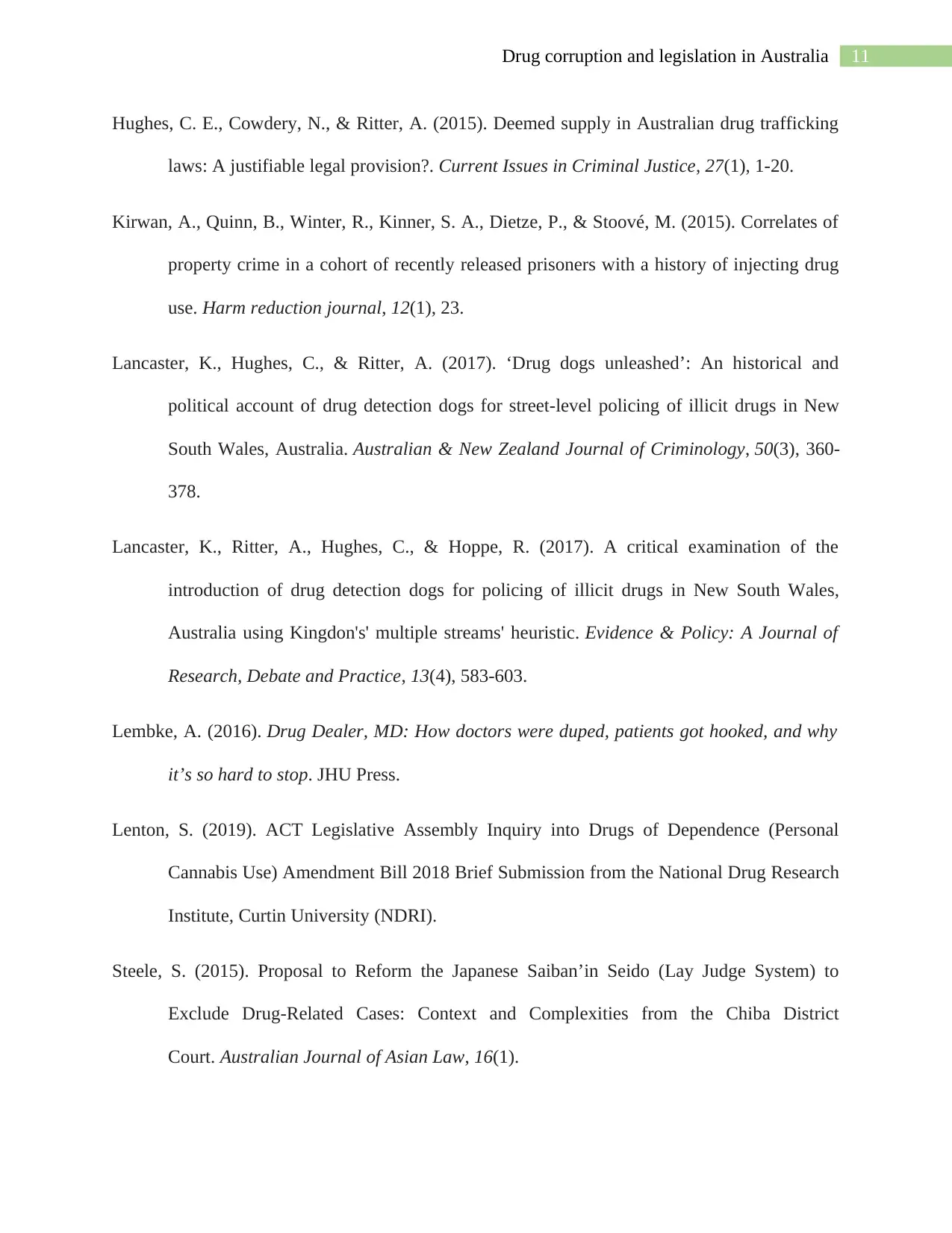
11Drug corruption and legislation in Australia
Hughes, C. E., Cowdery, N., & Ritter, A. (2015). Deemed supply in Australian drug trafficking
laws: A justifiable legal provision?. Current Issues in Criminal Justice, 27(1), 1-20.
Kirwan, A., Quinn, B., Winter, R., Kinner, S. A., Dietze, P., & Stoové, M. (2015). Correlates of
property crime in a cohort of recently released prisoners with a history of injecting drug
use. Harm reduction journal, 12(1), 23.
Lancaster, K., Hughes, C., & Ritter, A. (2017). ‘Drug dogs unleashed’: An historical and
political account of drug detection dogs for street-level policing of illicit drugs in New
South Wales, Australia. Australian & New Zealand Journal of Criminology, 50(3), 360-
378.
Lancaster, K., Ritter, A., Hughes, C., & Hoppe, R. (2017). A critical examination of the
introduction of drug detection dogs for policing of illicit drugs in New South Wales,
Australia using Kingdon's' multiple streams' heuristic. Evidence & Policy: A Journal of
Research, Debate and Practice, 13(4), 583-603.
Lembke, A. (2016). Drug Dealer, MD: How doctors were duped, patients got hooked, and why
it’s so hard to stop. JHU Press.
Lenton, S. (2019). ACT Legislative Assembly Inquiry into Drugs of Dependence (Personal
Cannabis Use) Amendment Bill 2018 Brief Submission from the National Drug Research
Institute, Curtin University (NDRI).
Steele, S. (2015). Proposal to Reform the Japanese Saiban’in Seido (Lay Judge System) to
Exclude Drug-Related Cases: Context and Complexities from the Chiba District
Court. Australian Journal of Asian Law, 16(1).
Hughes, C. E., Cowdery, N., & Ritter, A. (2015). Deemed supply in Australian drug trafficking
laws: A justifiable legal provision?. Current Issues in Criminal Justice, 27(1), 1-20.
Kirwan, A., Quinn, B., Winter, R., Kinner, S. A., Dietze, P., & Stoové, M. (2015). Correlates of
property crime in a cohort of recently released prisoners with a history of injecting drug
use. Harm reduction journal, 12(1), 23.
Lancaster, K., Hughes, C., & Ritter, A. (2017). ‘Drug dogs unleashed’: An historical and
political account of drug detection dogs for street-level policing of illicit drugs in New
South Wales, Australia. Australian & New Zealand Journal of Criminology, 50(3), 360-
378.
Lancaster, K., Ritter, A., Hughes, C., & Hoppe, R. (2017). A critical examination of the
introduction of drug detection dogs for policing of illicit drugs in New South Wales,
Australia using Kingdon's' multiple streams' heuristic. Evidence & Policy: A Journal of
Research, Debate and Practice, 13(4), 583-603.
Lembke, A. (2016). Drug Dealer, MD: How doctors were duped, patients got hooked, and why
it’s so hard to stop. JHU Press.
Lenton, S. (2019). ACT Legislative Assembly Inquiry into Drugs of Dependence (Personal
Cannabis Use) Amendment Bill 2018 Brief Submission from the National Drug Research
Institute, Curtin University (NDRI).
Steele, S. (2015). Proposal to Reform the Japanese Saiban’in Seido (Lay Judge System) to
Exclude Drug-Related Cases: Context and Complexities from the Chiba District
Court. Australian Journal of Asian Law, 16(1).
⊘ This is a preview!⊘
Do you want full access?
Subscribe today to unlock all pages.

Trusted by 1+ million students worldwide
1 out of 13
Related Documents
Your All-in-One AI-Powered Toolkit for Academic Success.
+13062052269
info@desklib.com
Available 24*7 on WhatsApp / Email
![[object Object]](/_next/static/media/star-bottom.7253800d.svg)
Unlock your academic potential
Copyright © 2020–2026 A2Z Services. All Rights Reserved. Developed and managed by ZUCOL.


